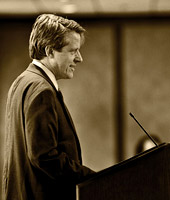 |
|
Summer 2009 | Volume 32, Number 2
| Features
|
|
|
Bursting Bubbles
What does human psychology have to do with the economy?

At SPU’s annual Downtown Business Breakfast, Robert Shiller said that bubbles — “social epidemics …
contagions of excitement” — are bound to burst.
Photo by Daniel Sheehan. |
In 1933, with the nation in the grip of the Great Depression, Robert Shiller’s forbearers tried a new product introduced at the Chicago World’s Fair: Kraft Miracle Whip. The salad dressing was billed as an alternative to mayonnaise.
Like much of America, the Shillers appreciated that the innovation had tang, but they were particularly impressed that it was cheap. Within seven months, Miracle Whip surpassed mayonnaise as the number one salad dressing in the country, and it is still the choice of many families today. Shiller thinks Starbucks’ affordable new instant coffee product, Via, may prove to be today’s Miracle Whip.
Such indicators of the national mindset are of great interest to Robert Shiller, renowned economist and the featured speaker at the 13th annual Seattle Pacific University Downtown Business Breakfast on April 27, 2009.
“You have to realize that it’s a remarkable phenomenon, the view that the housing market and the stock market were wonderful investments that would make us all rich. It doesn’t make a lot of sense from economic theory. They’re not going to make us all rich. What makes us rich is our work — that we do things and we make things — not that we all speculate in markets. Somehow that thought got lost.”
– Robert Shiller
A record-breaking 1,220 business and community leaders filled the Grand Ballroom of Seattle’s Westin Hotel to hear one of the few people to accurately predict the bursting of two financial “bubbles”: the dot-com collapse in technology stocks at the beginning of the decade, and the U.S. housing-market collapse leading to the current economic crisis.
Shiller is the Arthur M. Okun Professor of Economics at Yale University and one-half of the Standard & Poor’s Case-Shiller home price index. He is also a columnist for The New York Times and author of Subprime Solution and the best-selling Irrational Exuberance. His latest book, Animal Spirits: How Human Psychology Drives the Economy, and Why It Matters for Global Capitalism, was coauthored with 2001 Nobel Prize-winning economist George A. Akerlof.
In his Business Breakfast address, Shiller elaborated on the premise of Animal Spirits: that the causes of important economic events are largely psychological in nature. He emphasized the correlation between the mood of the public and the state of the economy. If, in the current economic climate, the nation settles into a depression mindset, Shiller argued that it can become a self-fulfilling prophecy with no end in sight. On the other hand, if the nation’s government and financial institutions are able to institute reform and restore trust, he said, the economy is more likely to turn around.
In an interview preceding the Breakfast, SPU Associate Professor of Economics Doug Downing, who earned his doctorate in economics at Yale, asked Shiller about his new book and other issues related to the worldwide recession.
 Read a Conversation With Robert Shiller Read a Conversation With Robert Shiller
Return to top
Back to Features Home
|
| |
|
 |
|
 |